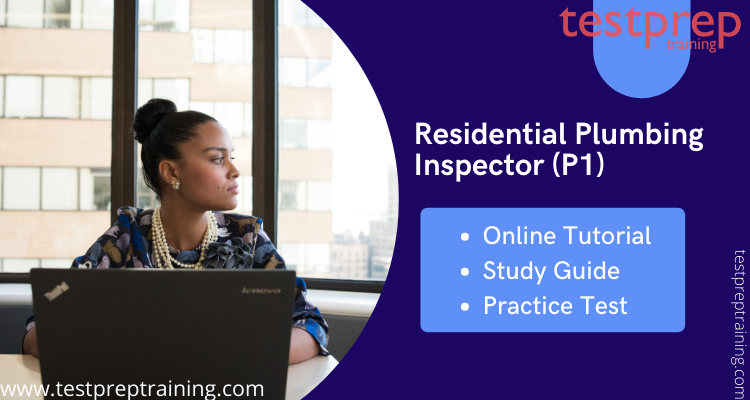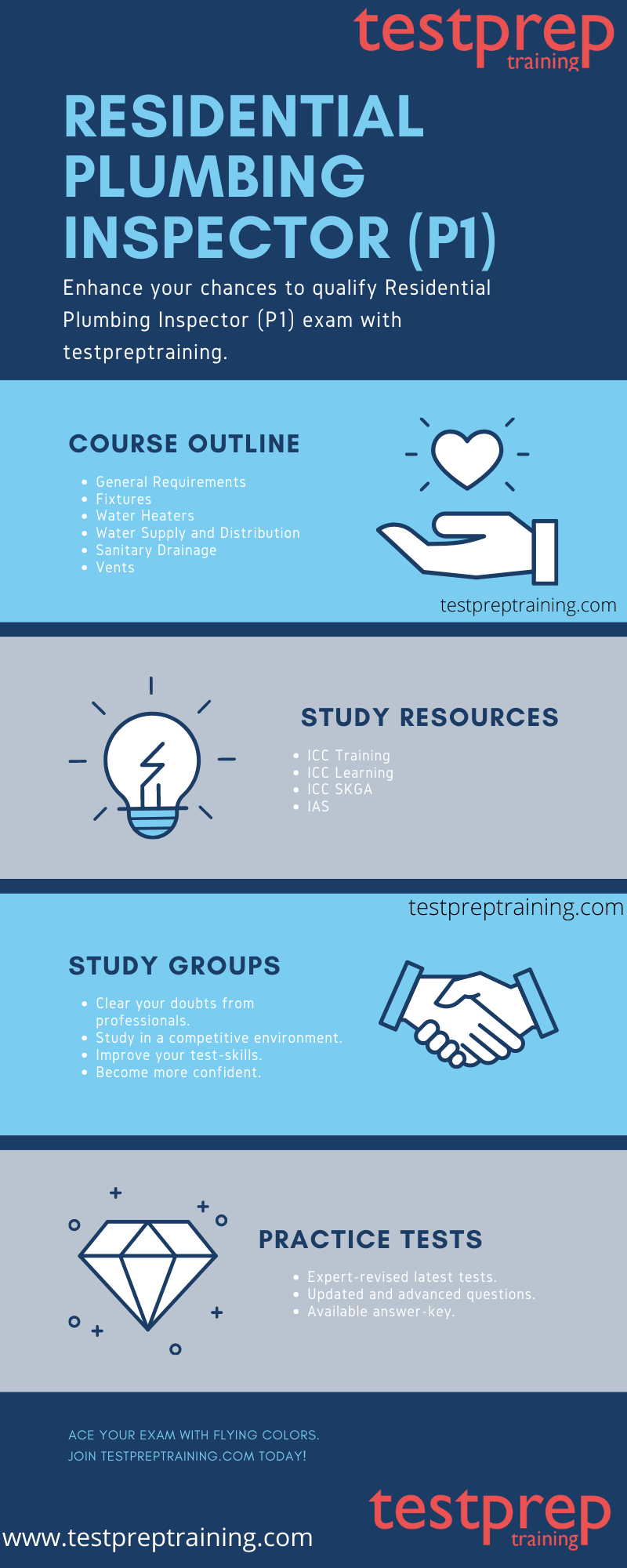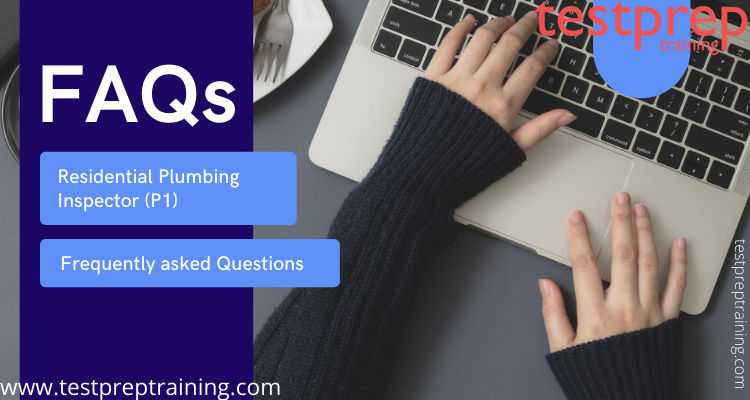Residential Plumbing Inspector (P1)

The Residential Plumbing Inspector (P1) exam offered by International Code Council (ICC), is for the candidates who aspire to become a Residential Plumbing Inspector. This exam is intended for those with complete knowledge for verifying the installation of the entire plumbing system in relation with the codes and standards adopted by their jurisdiction. Furthermore, one should know how to conduct inspection and understand all the laws and regulations to manage their department.
Exam Details
The Residential Plumbing Inspector (P1) is a national-level certification examination. This is an open book examination with the code year and exam id as 2018 and P1 respectively. The total number of questions in the examination is 60 and the candidates are provided with a time limit of 2 hours. Test questions are in four-options, multiple-choice questions, with one answer on each question scored as correct. Moreover, one should know that you will have six exam attempts within a six-month period and you are required to pay the exam fee at every attempt. Once you’ve attempted the exam six times, you must wait six months from the first attempt to register again. Also, the registration fee for Residential Plumbing Inspector (P1) exam is $219.00 USD.
Exam Format
The International Code Council (ICC) provides the following 2 ways:
- Firstly, Computer-based Testing (CBT).
- Secondly, Proctored Remote Online Testing Option (PRONTO).
Schedule your Exam
Before Taking the Certification exam, here are some registration tips that you should follow:
- Firstly, you must log in to myICC to make an exam purchase. If you already have an account, please contact ICC before creating a new one to ensure all of your information stays in one account.
- Secondly, you are required to pay for your exam first before you schedule if you taking a National Certification, California, or UST/AST exam via CBT or PRONTO. Moreover, you have one year to schedule or reschedule your exam without paying for it again.
- Thirdly, please enter your Legal name only exactly as it appears on the identification you will carry before testing. Entering wrong details will not let you take your test and no fees will be refunded.
- Lastly, you must have your government-issued photo identification ready to show the proctor.
Cancellation of Exam
The Code Council reserves the right to revoke or withhold any examination scores if, in its judgement, there is adequate reason to question their validity. The reasons are:
- Firstly, Giving or receiving assistance with answers during testing.
- Secondly, Using unauthorized materials during testing.
- Thirdly, violating the rules presented by the proctor(s).
- Lastly, attempting to, or removing examination materials or questions from the testing center.
In case of any of the above mentioned irregularities in the examination, involved candidates will not receive their scores unless approved by Code Council. Candidate might undergo restrictions like restrictions on retesting for up to next 3 years.
Roles and Responsibilities
The Residential Plumbing Inspector (P1) is responsible for verifying:
- The installation of the entire plumbing system in complaint with the codes and standards adopted by their jurisdiction.
- The installation and testing of piping systems.
- Protection of piping systems and building components.
- Approved materials and fixtures.
- Flow rates, pressures, volume and temperature.
- Protection of the potable water supply and distribution system.
- Other duties include verifying that all materials, joints, connections and appliances are of the approved type.
- Lastly, Fuel gas piping combustion air and required venting.
For More: Check Residential Plumbing Inspector (P1) FAQs
Course Outline
The Residential Plumbing Inspector (P1) exam consists of various sections and subsections the covers the following topics:
- General Requirements (13%)
- Permits (1%): Determine when permits are required and issue permits.
- Piping System Protection (3%): Inspect all piping systems to insure protection as required from corrosion, stress and strain, freezing, and physical damage.
- Piping System Installation (3%): Inspect all piping systems for proper installation, support, sleeving, penetrations, and waterproofing of exterior openings.
- Building Component Damage (3%): Inspect building components for damage due to installation of the plumbing systems.
- Testing (3%): Verify that all required tests of installed piping systems are conducted.
- Fixtures (8%)
- Locations and Required Fixtures (2%): Inspect for proper location and the minimum required fixtures.
- Materials and Fixture Approvals (1%): Inspect for approved materials and fixture approvals.
- Installation of Fixtures (2%): Inspect for proper installation of fixtures, waste receptors, appliances, and appurtenances, including clearances, access, and sealing.
- Flow Rates and Temperatures (2%): Inspect for maximum and minimum flow rates and temperature control valves.
- Installation of Faucets, Fixture Fittings, and Accessories (1%): Inspect for proper installation of faucets, fixture fittings, and accessories.
- Water Heaters (12%)
- Use and Installation of Materials and Appliances (2%): Inspect for proper use and installation of materials and check for appliance approval.
- Service and Distribution and Piping (3%): Inspect for clearances, locations, protection, pans, and seismic restraint.
- Valving, Discharge Piping, and Thermal Expansion (4%): Inspect for required valving, T&P valve and discharge piping installation, thermal expansion requirements, and pipe sizing.
- Fuel Gas Piping, Combustion Air, and Venting (3%): Inspect for proper sizing of fuel gas piping, combustion air requirements, and required venting.
- Water Supply and Distribution (22%)
- Materials Joints and Connections (3%): Inspect for approved materials, joints, and connections.
- Service and Distribution Piping (5%): Inspect the service and distribution piping for proper installation of cold and hot water delivery, identification, sizing, and valving.
- Potable Water Supply and Protection (7%): Inspect the potable water supply and distribution piping for proper protection against contamination.
- Non-potable Water Supply and Protection (2%): Inspect the non-potable water reuse distribution system for proper installation.
- Pressure and Volume (3%): Verify the minimum and maximum pressure and volume requirements.
- Potable Water and Water Treatment (2%): Verify the requirements for potable water and installation of water treatment.
- Sanitary Drainage (23%)
- Materials, Fittings, Joints, and Connections (4%): Inspect for approved materials and use of proper fittings, joints, and connections.
- Building Drains, Sewers, Branches, and Stacks (8%): Inspect for proper sizing and installation of the building drain, building sewer, branches, and stacks.
- Backwater Valves, Sumps, Ejectors, and Cleanouts (3%): Inspect for the proper installation of backwater valves, sumps, ejectors, and required cleanouts
- Traps (5%): Inspect for the correct type, size, design, location, and installation of traps.
- Indirect Waste Systems (3%): Inspect indirect waste systems for air breaks or air gaps.
- Vents (22%)
- Materials, Joints, Connections, and Grades (5%): Inspect for approved materials, joints, connections, and proper grades.
- Sizing (6%): Inspect for the proper sizing of the venting system.
- Requirements, Methods, and Installation (11%): Inspect for the minimum venting requirements, methods, and installation.
Residential Plumbing Inspector (P1) Study Guide
The Residential Plumbing Inspector (P1) exam requires a lot of experience and dedication combined with the rightful source of study material and guidance. The internet is filled with numerous resources but one should be very careful while choosing the best. One should always keep in mind that they should look for resources that are up to date and provide latest questions with numerous practice tests to improve your test-skills. Here is some useful resource that one could rely on completely to ace your examination.

Getting familiar with Course Outline
For Residential Plumbing Inspector (P1) exam the main objectives are:
- General Requirements
- Fixtures
- Water Heaters
- Water Supply and Distribution
- Sanitary Drainage
- Vents
Study Resources
- ICC Training: ICC Code Council provides its users with a variety of training options to earn education units, learning units and/or Professional Development Hours (CEUs, LUs and/or PDHs) that can be very useful toward Code Council Certification renewal.
- ICC Learning: ICC Code Council also provides its users with the Learning Center that facilitates you with an online library, face-to-face, virtual and web sessions of different courses ranging from beginning to advanced level topics in all ICC codes which includes topics like plumbing, design and construction, building safety and fire etc. The Learning Center serves as a path for the aspirants towards their desired certification.
- ICC SKGA: For engineering and building safety professionals that are looking to keep themselves updated with technical information on Residential Plumbing Inspector (P1), SKGA provides you with live as well as recorded web sessions and face-to-face topics training as required by the user.
- IAS: IAS offers its candidates with recorded web and in-person training programs for compliance assessment professionals worldwide. IAS also offers CEUs to hand out ongoing professional development requirements.
Join Online Study Groups
Joining online study groups is the most appropriate way to improve your examination skills and understanding things in a better way. Since, study groups provides you with a platform to discuss and clear your doubts in the best possible way with the help of professionals and peers. Moreover, joining study groups helps in keeping you updated with any recent modifications or any changes in the examination. One can improve their time management skills as well.
Take Practice Tests
While preparing for any examination the most important step is to take Practice tests. These tests are expert-revised that help you to check your preparation level, build your confidence and time management but also helps you to get familiar with different types of questions that are frequently asked in the examination. Moreover, Practice test consists of questions from basic to advanced level in a systematic manner.


